Uncovering conspiracy behind Shenyang incident
(China Daily 2002.06.11 Opinion)
http://www1.chinadaily.com.cn/cndy/2002-06-11/73222.html
誰だか知らんが新手で来たな。日本人筆者か成る程。感心してる場合か。
しかし中共メディアのW杯中国戦記事は、サワヤカ&サッパリしてましたね。「日本代表を目標に努力」...ホントにいいのか人民日報がそれで!? と日本人にまで思わず心配されてどうする。
(China Daily 2002.06.11 Opinion)
http://www1.chinadaily.com.cn/cndy/2002-06-11/73222.html
誰だか知らんが新手で来たな。日本人筆者か成る程。感心してる場合か。
しかし中共メディアのW杯中国戦記事は、サワヤカ&サッパリしてましたね。「日本代表を目標に努力」...ホントにいいのか人民日報がそれで!? と日本人にまで思わず心配されてどうする。










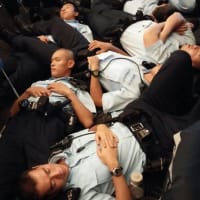
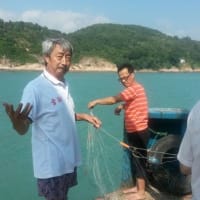
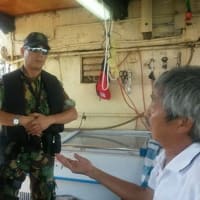
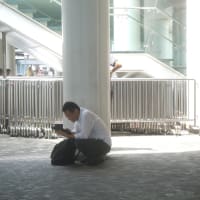
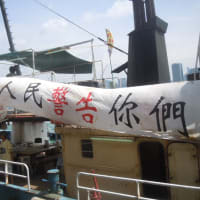

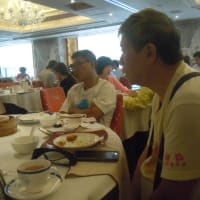
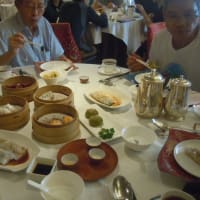
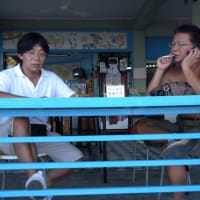
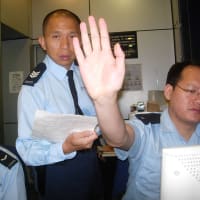
(China Daily 2002.06.11 Opinion)
The incident at the Japanese Consulate in Shenyang was something of a farce. Adding to the irony of the script, the Japanese media treated this "humanitarian issue" as the biggest news item for two weeks in spite of the fact that the Tokyo press usually portrays Democratic People's Republic of Korean (DPRK) refugees as an ominous threat to Japan's "homogeneous" society. Shenyang was, oddly, bigger news than the frantic preparations for the World Cup.
The story behind the Shenyang affair is a mystery that requires some detective work.
After loudly complaining to Beijing that the Chinese police had not been asked to enter the Japanese consulate, Japanese Prime Minister Junichiro Koizumi found himself in an embarrassing retreat in mid-May. In leaks to Japanese reporters, embassy staffers in Beijing disclosed that Japanese Foreign Ministry officials had actively opposed opening their diplomatic facilities to DPRK refugees. Opposition leader Naoto Kan, head of the Democratic Party, revealed that the consulate staff actually thanked the Chinese police for removing the refugees.
On May 14, embassy sources in Beijing leaked to the Tokyo-based newspapers Asahi Shimbun and The Japan Times that the Japanese ambassador to Beijing had told his staff members that any individuals who tried to evade security guards and enter Japanese diplomatic facilities should be treated as a potential suspects, since they could be terrorists. No objections were raised to his recommendation at the meeting in the Beijing embassy on May 8.
These instructions were delivered to a staff meeting at the Shenyang consulate on the same day, a few hours before two of five DPRK people rushed past guards into the compound. According to the Foreign Ministry report, the vice-consul in charge of dealing with the Chinese police telephoned the embassy in Beijing at least twice for instructions and did not oppose the Chinese guards' removal of the Koreans from the consulate grounds.
In response to these disclosures, Japanese Prime Minister Junichiro Koizumi on May 15 backed down from his earlier tough stance against the Chinese police. Chief Cabinet Secretary Yasuo Fukuda said that the ambassador's orders were "absolutely a matter of course" - in other words, in line with Japan's diplomatic procedures.
If the Chinese police were not to blame, why did this minor fracas get blown out of proportion by the mass media in Japan, the Republic of Korea (ROK) and the West?
To restate the question: Who had the foresight to point a video camera at the Shenyang consulate at the exact moment that the DPRK people tried to crash the gates? The answer is obvious: the group that staged this "spontaneous" event.
The Shenyang incident was part of a covert operation staged by "religious rights" campaigners in league with Western intelligence agencies and East Asian right-wingers. This unholy alliance is now threatening to disrupt the high-profile World Cup tourney.
The Financial Times on March 21 quoted German medical doctor Norbert Vollersten as saying: "The World Cup is the best opportunity to get our message across because there will be hundreds of international journalists and television crews in the country. There are lots of North Korean defectors in Seoul who are ready to speak out."
Now based in Seoul, Vollersten claimed credit for organizing the entry of 25 DPRK refugees into the Spanish Embassy in Beijing in mid-March. Vollersten said that more defections through Western embassies in Beijing were planned and compared the asylum bids with mass defections by East Germans in the 1980s that led to the demolition of the Berlin Wall.
The German doctor has since announced that his supporters will organize a mass exodus of DPRK "boat people" to the ports of Northeast China, as well as protests to be timed with the international football matches in the ROK and Japan.
Any genuine political refugee, in genuine fear for his or her life, would detect a lack of sincerity in Herr Doktor's loud proclamation.
For example, in interviews with the Western news media, he accused Pyongyang of feeding the bodies of prisoners to pigs and cattle. The doctor later admitted that he had never witnessed any such atrocities and based his reports purely on hearsay from DPRK people who were seeking refugee status in the West.
Cap Anamur, founded by anti-communist liberals in West Germany, found itself in ever-closer alliance with Catholic Church agencies in Somalia and Croatia. A possible motive behind the Beijing embassy campaign is the discrediting of ROK President Kim Dae-jung's "sunshine policy" toward DPRK.
In the same year as Vollersten's expulsion, Kim Dae-jung met with DPRK leader Kim Jong Il. At their summit in June 2000, the two Kims announced that they would jointly invite Pope John Paul II to visit both parts of divided Korea as a step toward peaceful reunification. In the same month, however, the ultra-conservative wing of the Vatican pushed for the Pope to denounce the "Red Dragon," a euphemism for China, in his speech at Fatima, Portugal.
Instead of encouraging a gradual union of equals, ultraconservatives inside and outside the church have been aiming to collapse the DPRK state. Vollersten explained that he aims to replicate the German reunification process, which began when East German refugees flooded into foreign embassies and neighbouring countries, an event that eventually led to the disintegration of East Germany. (Historians have since shown that the fall of the Berlin Wall was not entirely a spontaneous event, but was inspired through a calculated strategy of Western intelligence agencies.)
Vollersten is author of a two-part book, titled "Diary of a Mad Place," which was published in Tokyo and only in Japanese. His book made him into a minor figure of media curiosity in Japan, which partly explains why Japanese TV networks gave so much airtime to the Shenyang affair.
His efforts were publicized at the 3rd International Conference on North Korean Human Rights and Refugees in Tokyo in February. The Tokyo conference received funding from the National Endowment for Democracy, a foundation funded by the US Congress. One of the featured speakers was James Lilley, a former diplomat and CIA analyst. In attendance were the "usual suspects" from the noisy but small anti-Pyongyang network in Japan: rogue ROK intelligence agents, ethnically confused descendants of Koreans who collaborated with Japan's colonial rule before 1945, supporters of the Taiwan independence lobby, Catholic ultraconservatives, evangelical Christians and rightwing Buddhist groups - all eager to enlist in the payroll against the DPRK.
Who is Vollertsen? A lonely divorcee with a less-than-successful pediatric practice, in other words, a political nonentity, if not for his sponsor Cap Anamur. The German NGO has been active in Croatia, Bosnia, Kosovo, East Timor and Sudan - all the world's trouble spots. Cap Anamur, named after a rescue ship, was founded in 1979 during the Vietnamese boat people crisis. Cap Anamur claims to be a small nonprofit group with only one full-time staff person. Its leader, former journalist Rupert Neudeck, however, was exposed for engaging in blatant political propaganda in February 1993, when the head of the German Parliament discovered that Cap Anamur's report that 85 Croatian women were being raped by Serb soldiers in the Donja Stubica hospital was a total fabrication. Neudeck has not hidden his admiration of Western intelligence agencies, going so far as to lobby for the transformation of Radio Free Europe into Radio Free Africa. In 1999, Cap Anamur rebuilt housing in Zornick, Bosnia, in co-operation with USAID, an agency better known for providing cover rather than shelter.
After participating in a covert campaign of destabilization in the Balkans, the German team now hopes to repeat its successes against the DPRK and, with consummate ingratitude, their hosts the ROK and Japan. Shenyang was a warm-up match before the World Cup. The amateurish attempt to divide and rule the East Asian countries has gone scoreless so far, as Japanese and Korean fans cheer for China, and vice versa.
The author is a former editor of The Japan Times Weekly and founding faculty member of the Journalism and Media Studies Centre at The University of Hong Kong.